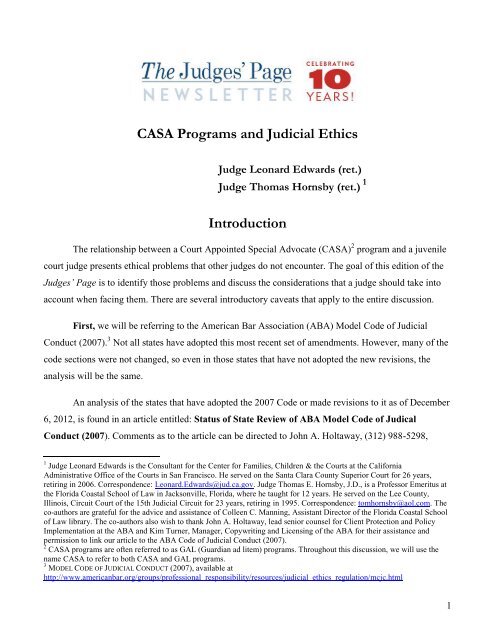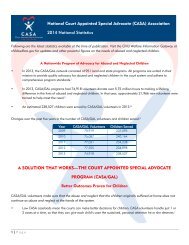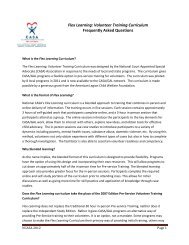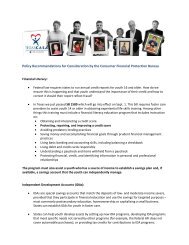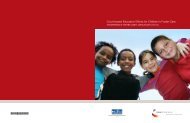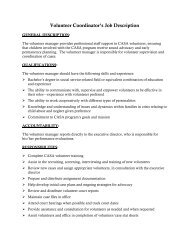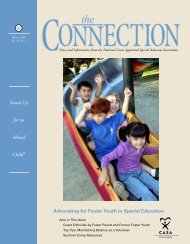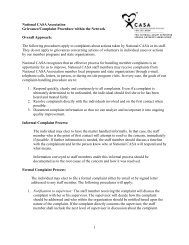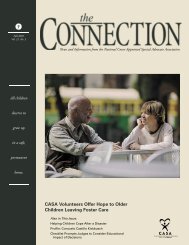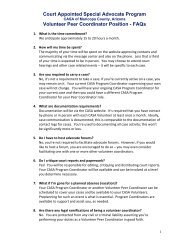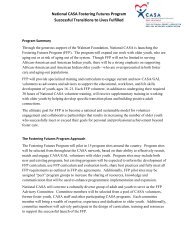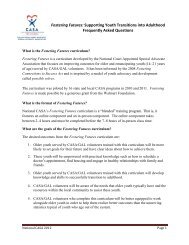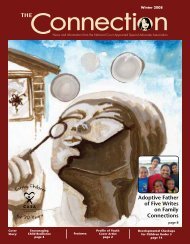CASA Programs and Judicial Ethics Introduction - National CASA
CASA Programs and Judicial Ethics Introduction - National CASA
CASA Programs and Judicial Ethics Introduction - National CASA
Create successful ePaper yourself
Turn your PDF publications into a flip-book with our unique Google optimized e-Paper software.
children under court jurisdiction <strong>and</strong> provide the court with better information about those children. Youtake the following actions:Hypothetical Situations1. You arrange for a meeting to take place on a Sunday <strong>and</strong> invite the public to attend. Thepurpose of the meeting is to start a <strong>CASA</strong> program.2. You have the court executive produce fliers for the meeting <strong>and</strong>distribute them throughout the community.3. You lead the meeting, first explaining the juvenile dependency system <strong>and</strong> then the need forvolunteers to help start a <strong>CASA</strong> program.Discussion4. You personally shake h<strong>and</strong>s with each of those who appear at the meeting <strong>and</strong>tell them that volunteering to work with an abused child will greatly help those children.Would you take any/all of these steps?Are there any ethical issues that you should be aware of in this scenario?These four actions mirror what Judge David Soukoup did when he created the first <strong>CASA</strong>program in King County (Seattle), Washington. 17 He may have even made up the fliers himself. Peoplecame from the community to see if they could help the juvenile court by working with the juvenile courtjudge. The steps outlined are aimed at creating resources for abused <strong>and</strong> neglected children <strong>and</strong> areconsistent with the juvenile court judge’s goal of serving the best interests of the children who appear injuvenile court. <strong>National</strong> organizations urge you to take these steps. 18 You are holding the meeting on a17 One of the authors has heard Judge Soukoup describe how he created the first <strong>CASA</strong> program several times in publicpresentations. See also History of <strong>National</strong> <strong>CASA</strong>, <strong>CASA</strong>: COURT APPOINTED SPECIAL ADVOCATES FOR CHILDRENhttp://www.casaboston.org/boston-casa-program/history-of-national-casa.aspx.18 “The <strong>National</strong> Council of Juvenile <strong>and</strong> Family Court Judges <strong>and</strong> the <strong>National</strong> <strong>CASA</strong> Association support your efforts to bea community leader in improving outcomes for abused children through establishment of a <strong>CASA</strong> program in yourcommunity.” Hornsby, Reviewing the Current Situation, at 54. “Judges should encourage the development of volunteerprograms, particularly Court Appointed Special Advocate programs <strong>and</strong> foster care review boards, to assist children <strong>and</strong>7
Sources: Canons 1 22 , 2 23 , 3 24 , Rules 3.1 25 & 3.7. 26B. Ethical Implications in Recruiting <strong>CASA</strong> VolunteersAs a juvenile court judge you would like to exp<strong>and</strong> the number of volunteersin your local <strong>CASA</strong> program. To accomplish this you take the following steps:Hypothetical Situations1. Go to several local service organizations (Rotary, Elks, etc.) to discuss the juvenile court, the<strong>CASA</strong> program <strong>and</strong> then ask the assembled persons to consider becoming <strong>CASA</strong> volunteers.2. Ask the Jury Commissioner in your court to give each prospective juror a copy of aflier containing statements by you encouraging citizens to become <strong>CASA</strong> volunteers.3. Personally ask retired persons who you know in the community to become <strong>CASA</strong> volunteers.4. Ask your clerk, court reporter, <strong>and</strong> bailiff to h<strong>and</strong> out the same fliers to persons entering thecourtroom, to attorneys who appear in your courtroom, <strong>and</strong> to their friends <strong>and</strong> family.5. Post fliers outside your courtroom, other judge’s courtrooms <strong>and</strong> in the clerk’s office.6. Appear on a television talk show to discuss <strong>CASA</strong> <strong>and</strong> the need for volunteers.7. Appear on a television spot in your robe talking about <strong>CASA</strong> with information on how tocontact the program written below your presentation.8. Create a flier with your picture in it, sitting robed with a child in your lap.22 MODEL CODE OF JUDICIAL CONDUCT Canon 1 (2007).23 MODEL CODE OF JUDICIAL CONDUCT Canon 2 (2007).24 MODEL CODE OF JUDICIAL CONDUCT Canon 3 (2007).25 MODEL CODE OF JUDICIAL CONDUCT R. 3.1 (2007).26 MODEL CODE OF JUDICIAL CONDUCT R. 3.7 (2007).9
Discussion9. Be featured on a poster distributed throughout the community which shows apicture of you robed <strong>and</strong> pointing a finger outward saying. “I WANT YOU TOVOLUNTEER TO BE A <strong>CASA</strong>!”Would you take any of these actions?Are there ethical issues with regard to any of these proposed actions?The previous section addressed the propriety of taking steps to create a <strong>CASA</strong> program. This setof scenarios covers the ethical <strong>and</strong> legal limits you face as you attempt to exp<strong>and</strong> the local <strong>CASA</strong>program.Both Canon 3 27 (Rules 3.1 28 & 3.7 29 ) <strong>and</strong> the Advisory Committee Commentary encouragejudges to contribute to the improvement of the law, the legal system, <strong>and</strong> the administration of justice.Rule 3.2 Extrajudicial Activities in General <strong>and</strong> Comments 1 <strong>and</strong> 2 are helpful as stated:COMMENT[1] …judges are permitted <strong>and</strong> encouraged to engage in educational, . . . charitable, . . . orcivic activities not conducted for profit, even when the activities do not involve the law.[2] Participation in both law-related <strong>and</strong> other extrajudicial activities helps integratejudges into their communities, <strong>and</strong> further public underst<strong>and</strong>ing of <strong>and</strong> respect for courts<strong>and</strong> the judicial system. 30In scenario (1) you are speaking to community service organizations about the needs of fosterchildren <strong>and</strong> the value of <strong>CASA</strong>. This is ethical behavior. You can also say to those in attendance thatthey can become a part of the <strong>CASA</strong> program <strong>and</strong> give details regarding how they may volunteer for thelocal <strong>CASA</strong> program. You could point out that there are many ways to participate in the program,whether as a volunteer, a board member, an in-kind service provider, an event volunteer, or a committeemember. You should not dem<strong>and</strong> or order that anyone become a volunteer – that would be using the27 MODEL CODE OF JUDICIAL CONDUCT Canon 3 (2007).28 MODEL CODE OF JUDICIAL CONDUCT R. 3.1 (2007).29 MODEL CODE OF JUDICIAL CONDUCT R. 3.7 (2007).30 MODEL CODE OF JUDICIAL CONDUCT R. 3.1, cmts. 1 & 2 (2007).10
power of the judiciary improperly. 31 However, you can certainly direct potential participants to contactthe appropriate <strong>CASA</strong> representative; this action would be taken in response to a question from theaudience. A better approach would be to have a <strong>CASA</strong> representative as a part of your presentation orpresent in the room while you are speaking. That person can let the audience know how to contactsomeone concerning participation in the <strong>CASA</strong> program.In scenario (2) you have asked the jury commissioner to pass out leaflets describing the <strong>CASA</strong>program to all prospective jurors. This request will place a new responsibility on a public employee. Abetter approach would be to have the leaflets available in the jury waiting room for anyone interested inthe <strong>CASA</strong> program. In this way you would not be asking a court employee to undertake a task that is nota part of his or her job description. You should inform the presiding judge of your effort to ensure thathe or she approves. It may be that the presiding judge would not approve of passing out fliers. TheTexas Committee on <strong>Judicial</strong> <strong>Ethics</strong>, in an opinion involving the issue of “whether a judge may permitbrochures in her courtroom <strong>and</strong> other public areas in the courtroom that announce the availability of acounty bar sponsored lawyer referral service”, concluded that “by informing the public of this barsponsored service, the judge is improving the administration of justice.” 32In scenario (3) you are considering asking retired persons in the community whom you know tobecome <strong>CASA</strong> volunteers. This would be ethical if you were to phrase your request something like . . .“now that you are retired, have you considered some volunteer work? I can let you know about somevolunteer work that would greatly assist the court.” This is consistent with Rule 3.7(A)(6) 33 & (B) 34 .However, when soliciting participation by citizens, you should not solicit persons if they are likely everto appear before the court you serve on. Rule 3.1(B) added a prohibition of participating in extrajudicialactivities that will “lead to frequent disqualification of the judge.” 35 Scenario (4) is similar to scenario(2) except that you are asking your court staff to give out information about the <strong>CASA</strong> program. Theanalysis is the same as in scenario (2). You should not be asking court employees to undertake tasks thatare beyond what they are required to do pursuant to their job description. You could ethically considermaking available descriptive material in the court waiting room or posting it on a court bulletin board.That is the suggestion in scenario (5). The only caution in this scenario is that you should clear your31 See MODEL CODE OF JUDICIAL CONDUCT R. 3.1(D) (2007).32 Tex. Comm. On <strong>Judicial</strong> <strong>Ethics</strong> Op. 203 (1996).33 MODEL CODE OF JUDICIAL CONDUCT R. 3.7(A)(6) (2007).34 MODEL CODE OF JUDICIAL CONDUCT R. 3.7(B) (2007).35 MODEL CODE OF JUDICIAL CONDUCT R. 3.1(B) (2007).11
proposed action with the presiding judge of the superior court. This is not an ethical caution, but judgesshould always keep their presiding or supervising judge informed about such actions.In scenarios (6) <strong>and</strong> (7) you are considering going on television or radio to promote the <strong>CASA</strong>program. These are ethical actions so long as you act consistently with the cautions listed in Rule 3.1. 36The same cautions apply as did with public speaking as in scenario (1).However, the fact that you are going to wear a robe on the television appearance raises anadditional ethical issue. The question is whether your conduct “promotes public confidence in theintegrity . . . of the judiciary.” 37 <strong>Judicial</strong> robes are more than simply a choice of clothing – they representthe office of the judiciary. Out-of-court use of the robe is permitted at ceremonial events such asinvestitures <strong>and</strong> weddings. Whether wearing a robe is ethical may depend on the location of the filming.It would be improper in the television studio, but likely proper if taken while you were sitting on thebench. The issue is so close that the safest practice is to appear without a robe. After all, you will beidentified as a judge, so the robe is unnecessary for purposes of identification. The Texas Committee on<strong>Judicial</strong> <strong>Ethics</strong>, when asked whether a judge may appear on television in a public service announcementasking people to volunteer their time as readers for the nonprofit organization Recording for the Blind<strong>and</strong> Dyslexic, concluded that the judge “…may make such announcement so long as the prestige ofjudicial office is not used,” but the judge should not wear a judicial robe when making theannouncement. 38 In contrast, The State Bar of Michigan St<strong>and</strong>ing Committee on Professional <strong>and</strong><strong>Judicial</strong> <strong>Ethics</strong> stated that a judge may not serve as a “celebrity guest” on a radio show with anaccompanying of prerecording of “a public service announcement to be broadcast on the program urgingthe public to join the organization, or agreeing to be interviewed about why the judge is a member <strong>and</strong>why it is important to join, because such activities amount to personal solicitation. . .” which isprohibited by the Michigan Code of <strong>Judicial</strong> Conduct. 39In scenario (8) it is suggested that you appear in a photograph with a child sitting on your lap as apart of a promotion for the <strong>CASA</strong> program. This may not be upholding the integrity of the judiciary(Rule 1.3 40 ), <strong>and</strong> it may be seen as demeaning the judicial office (Rule 1.2 41 ). Judges do not normally36 MODEL CODE OF JUDICIAL CONDUCT R. 3.1 (2007).37 MODEL CODE OF JUDICIAL CONDUCT R. 1.2 & 1.3 (2007).38 Tex. Comm. On <strong>Judicial</strong> <strong>Ethics</strong> Op. 253 (1999)39 Mich. <strong>Ethics</strong> Comm. Op. J1-87 (1994)40 MODEL CODE OF JUDICIAL CONDUCT R. 1.3 (2007).12
take children on their laps in court. On the other h<strong>and</strong>, the robe “merely furnishes a convenient way toidentify the subject of the photograph as a judge.” The photograph of the robed judge with a child lendsprestige to the <strong>CASA</strong> program, a program concerning the improvement of the law. No private interest isbeing promoted by this photograph. However, even if done in good taste, this photograph may demeanthe judicial office as picturing a judge in an unusual non-judicial pose. You should decline thissuggestion.Scenario (9) is similar to scenario (8) in that it involves appearing off-the-bench in a robe for aposter promoting <strong>CASA</strong>. This involves unethical behavior in that you would not be promoting theintegrity of the judiciary, <strong>and</strong> this would be improper behavior in violation of Canon 1 42 , as well asdemeaning the judicial office in violation of Rule 1.2. 43The New York Advisory Committee of <strong>Judicial</strong> <strong>Ethics</strong> determined that a judge may notprovide a statement of endorsement for the local <strong>CASA</strong> organization for inclusion in abrochure used to recruit volunteers because it had been previously determined that ajudge should not, on behalf of a nonprofit organization, solicit volunteers to do physicallabor, solicit contributions or serve on committees or on the board of directors of theorganization. 44Opinions 98-98; 98-119. 45 Sources: Canon 1 46 , Rule 1.2 47 & 1.3 48 .C. Ethical Implications of FundraisingYou have been told that your <strong>CASA</strong> program needs additional funding to strengthen the program<strong>and</strong> provide more volunteers for dependent children. You are considering taking the following steps:Hypothetical Situations41 MODEL CODE OF JUDICIAL CONDUCT R. 1.2 (2007).42 MODEL CODE OF JUDICIAL CONDUCT Canon 1 (2007).43 MODEL CODE OF JUDICIAL CONDUCT R. 1.2 (2007).44 Hornsby, Reviewing the Current Situation at 65.45 N.Y. Advisory Comm. on <strong>Judicial</strong> <strong>Ethics</strong> Op. 02-80 (2005).46 MODEL CODE OF JUDICIAL CONDUCT Canon 1 (2007).47 MODEL CODE OF JUDICIAL CONDUCT R. 1.2 (2007).48 MODEL CODE OF JUDICIAL CONDUCT R.1.3 (2007).13
1. Help organize the local <strong>CASA</strong> fundraiser.2. Have your name appear on the fundraiser invitation.3. Ask all judges, court commissioners, <strong>and</strong> court employees to attend the event.4. Appear at the local <strong>CASA</strong> fundraiser.5. Be honored at the <strong>CASA</strong> fundraiser.6. Speak at the fundraiser.7. Urge attendees to support the <strong>CASA</strong> program.8. Offer a dinner for eight at your home in the <strong>CASA</strong> auction.9. Offer to caddy for the highest bidder at the <strong>CASA</strong> auction.10. Assist in the management <strong>and</strong> investment of the funds raised at the event.Discussion11. Write a letter supporting a <strong>CASA</strong> grant application.Are there legal or ethical issues with regard to any of these proposed actions?The relationship between the juvenile court judge <strong>and</strong> fundraising for a <strong>CASA</strong> organizationinvolves several complex ethical issues. In scenario (1), you may assist in the planning of a fundraisingevent. 49 In scenario (2), your name may appear on the invitation, but only as a committee member, notas the person requesting that persons attend the event. 5049 See MODEL CODE OF JUDICIAL CONDUCT R. 3.7(A)(1) (2007).50 See MODEL CODE OF JUDICIAL CONDUCT R. 3.7, cmt. (4) (2007).14
You may ask judges to attend in scenario (3), but not subordinate judicial officers or courtemployees. That would be using the power of the judicial office improperly by personally participatingin the solicitation of funds. 51You may appear at the fundraiser as in scenario (4), <strong>and</strong> be honored as in scenario (5) 52 so longas you do not personally solicit funds or engage in conduct that appears to lend prestige of the office tothe organization. You may also speak at the event in scenario (6), so long as you do not personallysolicit funds <strong>and</strong> otherwise comply with the canons. 53In scenario (7) you are asking the attendees to support the <strong>CASA</strong> program. That would likely beinterpreted as a violation of Rule 3.7(4) 54 as a personal solicitation of funds. In the alternative, you couldexplain the need for volunteers <strong>and</strong> what those volunteers can do to help the children in the juveniledependency court without violating any ethical st<strong>and</strong>ards. This would be appropriate so long as theaudience did not include persons who are likely to appear before the court on which you serve.Moreover, the solicitation cannot appear to be coercive in nature <strong>and</strong> violate Rule 3.1(D). 55Both offering a dinner at your house as in scenario (8), <strong>and</strong> offering to caddy for the highestbidder as in scenario (9) are violations of Canon 1. 56 Participation in these events would demean thejudicial office.Scenario (10) asks if you can help with the management <strong>and</strong> investment of the funds raised at theevent. These are ethical actions pursuant to Rule 3.7(A). 57 You can also write letters of support for<strong>CASA</strong> <strong>and</strong> other service provider grant applications. The letters must be factual, stating your personalknowledge of the program <strong>and</strong> the need for the grant. <strong>CASA</strong> is an organization that helps improveoutcomes for children before the court, thus it comes within the provisions of Rule 3.7. 5851 See MODEL CODE OF JUDICIAL CONDUCT R. 3.1(D) <strong>and</strong> 3.7(A)(s) (2007).52 See MODEL CODE OF JUDICIAL CONDUCT R. 3.7(A)(4) (2007).53 See Id.54 Id.55 MODEL CODE OF JUDICIAL CONDUCT R. 3.1(D) (2007).56 MODEL CODE OF JUDICIAL CONDUCT Canon 1 (2007).57 MODEL CODE OF JUDICIAL CONDUCT R. 3.7(A) (2007).58 MODEL CODE OF JUDICIAL CONDUCT R. 3.7 (2007).15
The judicial advisory opinions are in conflict. 59 In Nebraska, for instance, the <strong>Ethics</strong> Advisorycommittee concluded that “a judge may write a letter of support for a funding grant on behalf of a victimassistance or <strong>CASA</strong> agency based on . . . personal knowledge.” 60 The committee determined that such awritten recommendation would not be considered a direct participation by the judge in fundraising. 61The Florida <strong>Judicial</strong> <strong>Ethics</strong> Advisory Committee, however, determined that a judge may not write aletter to a grant provider which encourages “the funding of a local nonprofit organization that providesvictims of domestic violence with advocates.” 62 The committee was concerned that by writing such aletter, a judge (would be indirectly assisting litigants or witnesses (alleged victims) that would appearbefore the Court) <strong>and</strong> that this “could affect the perception of impartiality.” 63“Examples of other activities that may be permitted or not in a particular state are as follows:Judges may serve or be listed on an honorary committee of a charitable fundraisingevent. 64Judges may be celebrity guests (e.g. “celebrity chef,” “celebrity bagger”) at fundraisingevents. 65 Judges may be a guest of honor at a fundraising dinner. 66 But see Illinois<strong>Judicial</strong> <strong>Ethics</strong> Committee Opinions Nos. 01-03 (May 1, 2001) (Judge may not be a guestof honor at a non-fundraising event held by a nonprofit organization whose employeesregularly testify in adversary proceedings before that judge) 67 <strong>and</strong> 1-05 (May 1, 2001)(judge may not be a speaker or guest of honor at …[charitable organization’s] fundraising events). 68 ” 6959 Hornsby, Reviewing the Current Situation at 1.60 Neb. <strong>Ethics</strong> Advisory Op. 98-4 (August 19, 1998).61 Id.62 Fla. Sup. Ct. <strong>Judicial</strong> <strong>Ethics</strong> Comm. Op. 2002-09 (June 3, 2002).63 Id.64 Ind. Comm’n on <strong>Judicial</strong> Qualifications Op. 1-96. But, see Nev. St<strong>and</strong>ing Comm. on <strong>Judicial</strong> <strong>Ethics</strong> & Election PracticesOp. JE01-003 (April 5, 2001) (a judge may not allow his or her name to be listed on an honorary committee for primarilyfund-raising activity or event).65 Tex. Comm. on <strong>Judicial</strong> <strong>Ethics</strong> Op. 220 (1997); see also Kan. <strong>Judicial</strong> <strong>Ethics</strong> Advisory Op. JE-78 (July 11, 1997). But seeIll. <strong>Judicial</strong> <strong>Ethics</strong> Comm. Op. No. 99-1 (January 12, 1999) (a judge may not serve as a celebrity bagger for the United Way).66 Tex. Comm.on <strong>Judicial</strong> <strong>Ethics</strong> Opinion No. 252 (1999).67 Ill. <strong>Judicial</strong> <strong>Ethics</strong> Comm. Op. 01-03 (May 1, 2001)68 Ill. <strong>Judicial</strong> <strong>Ethics</strong> Comm. Op 1-05 (May 1, 2001)69 Thomas E. Hornsby. & Dulce B. Pouralifazel, Reviewing the Current Situation in JUDGES’ GUIDE TO <strong>CASA</strong>/GALPROGRAM DEVELOPMENT, 59 (Nat’l <strong>CASA</strong> Assoc. Resource Library Publication 2004 & Supp. 2010).16
Sources: Canon 1 70 , <strong>and</strong> Canon 3 71 , Rule 3.1 72 , 3.7 73 .D. Ethical Implications of Participating inAdministrative <strong>and</strong> Board Activities of the <strong>CASA</strong> ProgramIn the previous sections we have discussed the creation of a <strong>CASA</strong> program <strong>and</strong> some of theissues regarding the judge’s efforts to raise money to support the program. In this section, we willexplore other aspects of the judge-<strong>CASA</strong> relationship.Hypothetical SituationsYour community has established a <strong>CASA</strong> program. It has an executive director <strong>and</strong> a board ofdirectors. Your local <strong>CASA</strong> board of directors has asked you, a juvenile court judge, to participate in thefollowing activities.1. Become a member of the board of directors.2. Become an advisory member of the board of directors.3. Attend all board meetings as a friend of the board.4. Believing it would improve the local program, the board asks you to attend a <strong>National</strong> <strong>CASA</strong>conference with the board paying for all of your expenses. They also invite your spouse tojoin you on the trip.5. Would it make any difference in scenario (4) if you were also asked to speak at the nationalconference?6. Meet with the <strong>CASA</strong> director from time to time to discuss administrative issues such as thequality of <strong>CASA</strong> reports <strong>and</strong> the role of the advocates in court.70 MODEL CODE OF JUDICIAL CONDUCT Canon 1 (2007).71 MODEL CODE OF JUDICIAL CONDUCT Canon 3 (2007).72 MODEL CODE OF JUDICIAL CONDUCT R. 3.1 (2007).73 MODEL CODE OF JUDICIAL CONDUCT R. 3.7 (2007).17
DiscussionAre there ethical issues related to any of these activities?How would you respond to these requests from the board?While you may be an enthusiastic supporter of the <strong>CASA</strong> program, you must be cautious inresponding to some of the requests that the board of directors makes of you. For example, in scenario(1), they ask you to become a member of the board. This would be improper based on Rule 3.7(A)(6)(a)<strong>and</strong> (b) 74 . While <strong>CASA</strong> is an agency devoted to the improvement of the law, the legal system, <strong>and</strong> theadministration of justice <strong>and</strong> it is a non-profit organization, <strong>CASA</strong> does become engaged in judicialproceedings “that would ordinarily come before the judge”, <strong>and</strong> “will be engaged frequently inadversary proceedings in the court of which the judge is a member.” 75 You should decline the request tobecome a member of the board of directors.<strong>Judicial</strong> advisory opinions differ in their interpretation of this issue.The Kansas <strong>Judicial</strong> <strong>Ethics</strong> Committee determined that a magistrate judge could serve asa director for a <strong>CASA</strong> program <strong>and</strong> is allowed to engage in limited fundraising activity.Conversely, the Nebraska <strong>Judicial</strong> <strong>Ethics</strong> Committee determined that the Code of <strong>Judicial</strong>Conduct would prohibit a judge from serving on a <strong>CASA</strong> board outside the judge’sjudicial district because: “Such service could create a perception that the judge’simpartiality could be cast in doubt.” 76The opinion also commented that serving on a <strong>CASA</strong> board may further be prohibited by codeprovisions prohibiting a judge’s participation in direct fundraising. 77 The Texas Committee on <strong>Judicial</strong><strong>Ethics</strong> 78 held that judges may not serve on the board of a nonprofit organization that trains volunteers<strong>and</strong> employs professional staff to be appointed by the judge as guardians of minors or incapacitatedpersons. 79 The Texas State Commission on <strong>Judicial</strong> Conduct in Public Statement No. PS-2006-1, issuedon November 18, 2005, concluded that a judge that hears cases in which <strong>CASA</strong> volunteers appear asadvocates, or who has appellate jurisdiction over such cases, cannot serve as a member of the board of74 MODEL CODE OF JUDICIAL CONDUCT R. 3.7(A)(6)(a) <strong>and</strong> (b) (2007).75 See MODEL CODE OF JUDICIAL CONDUCT R. 3.7(6) (2007).76 Thomas E. Hornsby. & Dulce B. Pouralifazel, Reviewing the Current Situation in JUDGES’ GUIDE TO <strong>CASA</strong>/GALPROGRAM DEVELOPMENT, 66 (Nat’l <strong>CASA</strong> Assoc. Resource Library Publication Supp. 2010) citing Kan. <strong>Judicial</strong> <strong>Ethics</strong>Advisory Op. JE-52 (October 21, 1994) <strong>and</strong> quoting Neb. <strong>Judicial</strong> <strong>Ethics</strong> Op. 05-1 (January 20, 2005).77 Hornsby, supra, note 5, at 66.78 Tex. Committee on <strong>Judicial</strong> <strong>Ethics</strong> opinion No. 240 (1999)79 Hornsby, supra, note 5, at 66.18
directors of either a local or state <strong>CASA</strong> organization. The commission reasoned “judges who serve anorganization like <strong>CASA</strong> would endanger the public perception of the judge’s impartiality for it wouldnot be unreasonable for the public to believe that a judge who is affiliated with <strong>CASA</strong> would endorse<strong>and</strong> be partial to <strong>CASA</strong> <strong>and</strong> the <strong>CASA</strong> volunteer’s recommendations.” However, the commission noted“that the appearance of impropriety in some cases could be cured with a full disclosure ofthe judge’s affiliation with <strong>CASA</strong>, on the record, followed with the informed consent ofthe parties <strong>and</strong> their counsel to allow the judge to continue to hear <strong>and</strong> decide the case.Naturally, if a judge were asked to recuse from cases too frequently because of therelationship with <strong>CASA</strong>, that judge should step down from his or her membership on theBoard. Canon 3B(1).” 80Also, the New Mexico Advisory Committee on the Code of <strong>Judicial</strong> Conduct 81 opined that it would notbe proper for a judge to serve on the board of directors of the <strong>CASA</strong> program in the judge’s district.“[T]he committee referred to Section 21-5003(a)A(ii) – which prohibits a judge from being a directorfor an organization that “engaged in adversary proceedings in the court of which the judge is a member.”The committee reasoned that the rule applied because the judge was part of a court in which <strong>CASA</strong>volunteers regularly appeared.” 82Nevada’s St<strong>and</strong>ing Committee on <strong>Judicial</strong> <strong>Ethics</strong> has reasoned that a judge may not serve on the <strong>CASA</strong>Foundation Board. 83 “The <strong>CASA</strong> Foundation is a non-profit organization that promotes, administrates<strong>and</strong> engages in fund-raising activities to support the <strong>CASA</strong> program.” 84You should not become a member of an advisory board as suggested in scenario (2). Even ifbeing a member did not compromise the appearance of impartiality Canons 1 85 <strong>and</strong> 2 86 , <strong>CASA</strong> doesengage in adversary proceedings in the court, thus you would be in violation of Rules 3.1 87 & 3.7 88 .However, the New Mexico Advisory Committee on the Code of <strong>Judicial</strong> Conduct 89determined that district judges may serve on a <strong>CASA</strong> <strong>Judicial</strong> Advisory Board becausetheir duties as members of the board are to speak at training sessions <strong>and</strong> report on80 Id.81 N. M. Advisory Comm. on the Code of <strong>Judicial</strong> Conduct <strong>Judicial</strong> Advisory Opinion No. 96-06 (May 29, 1996)82 Hornsby, Reviewing the Current Situation at 66.83 Nev. St<strong>and</strong>ing Comm. <strong>Judicial</strong> <strong>Ethics</strong> Advisory Op. JE11-009 (Sept. 2011).84 Id. at 1.85 MODEL CODE OF JUDICIAL CONDUCT Canon 1 (2007).86 MODEL CODE OF JUDICIAL CONDUCT Canon 2 (2007).87 MODEL CODE OF JUDICIAL CONDUCT R. 3.1 (2007).88 MODEL CODE OF JUDICIAL CONDUCT R. 3.7 (2007).89 N.M. Advisory Comm. on the Code of <strong>Judicial</strong> Conduct <strong>Judicial</strong> Advisory Op. 2001-02 (February 28, 2001)19
epresentation provided by the volunteers. In support of their decision, the board citedRule 25-500 (B) which allows a judge to speak, write, lecture or teach concerning the law<strong>and</strong> the legal system. The committee concluded that it would be improper for the <strong>CASA</strong>directors to include the judges’ names on the <strong>CASA</strong> letterhead because doing so impliesthat the judge is in a leadership position involved in fundraising. This implication wouldgive the appearance of impropriety when considered in light of Rule 21-00 (C) (3) (a)(I). 90You may ethically attend all board meetings as in scenario (3), so long as these meetings do notinterfere with your judicial duties. 91 Your attendance may give the appearance that you were an advisorto the board, but your primary reason for going should be to coordinate the <strong>CASA</strong> program with juvenilecourt operations. You may discuss administrative matters with the director of the program just as youdiscuss such matters with the director at the children’s services agency <strong>and</strong> lawyers’ offices. You shouldadvise all board members that you cannot discuss specific cases <strong>and</strong> that the board should not discussspecific cases while you are in attendance.In scenarios (4) <strong>and</strong> (5) the <strong>CASA</strong> board proposes to send you to a <strong>National</strong> <strong>CASA</strong> event. Youcan certainly attend the <strong>National</strong> <strong>CASA</strong> Conference as many judges do, but you should not accept the<strong>CASA</strong> board’s offer of paying for your (or your spouse’s) expenses. That would be a violation of Rule3.1(C). 92 You would be giving the appearance that a party who regularly appears in your court has aspecial relationship with you. However, you would be permitted to receive reimbursement for yourexpenses from <strong>National</strong> <strong>CASA</strong> were you to be a speaker at the conference 93 . You would have theobligation to report the receipt of such reimbursement 94 .Meeting with the <strong>CASA</strong> director to discuss administrative issues as in scenario (6) presents noethical issues so long as the conversation is confined to that type of issue. These meetings are similar tothe administrative meetings you may ethically hold with the director of children’s services, the chiefprobation officer, <strong>and</strong> the heads of the attorney offices.Sources: Canons 1 95 , 2 96 , & 3 97 , Rules 3.1 98 , 3.14 99 , 3.15 100 .90 Hornsby, Reviewing the Current Situation at 67.91 See MODEL CODE OF JUDICIAL CONDUCT R. 3.1(A) (2007).92 MODEL CODE OF JUDICIAL CONDUCT R. 3.1(C) (2007).93 MODEL CODE OF JUDICIAL CONDUCT R. 3.14 (2007).94 MODEL CODE OF JUDICIAL CONDUCT R. 3.15 (2007).95 MODEL CODE OF JUDICIAL CONDUCT Canon 1 (2007).96 MODEL CODE OF JUDICIAL CONDUCT Canon 2 (2007).97 MODEL CODE OF JUDICIAL CONDUCT Canon 3 (2007).20
E. Ethical Implications in Participating in <strong>CASA</strong> Training <strong>and</strong>CeremoniesThe local <strong>CASA</strong> program would like you to assist the program in severalways, including the following:Hypothetical Situations1. Swear in new volunteers in the courtroom while wearing your robe.2. Speak to the volunteers at the swearing in ceremony.3. Be photographed with individual volunteers as they are sworn in.4. Permit the volunteers to sit in your courtroom to observe dependency proceedings.5. Lead a training for the volunteers. The training would include tips on how to write effectivereports, how to be an effective witness in court, <strong>and</strong> suggestions on what a volunteer shouldnot do in or outside the court.Discussion6. Sit as a judge in a mock trial where volunteers will be testifying <strong>and</strong> give advice to theattendees.Are there ethical issues related to any of these proposed activities?Training of <strong>CASA</strong> volunteers is required by <strong>National</strong> <strong>CASA</strong>, by state statute, <strong>and</strong> by local <strong>CASA</strong>programs. It is a critical part of volunteer education. Often local attorneys, social workers, service98 MODEL CODE OF JUDICIAL CONDUCT R. 3.1 (2007).99 MODEL CODE OF JUDICIAL CONDUCT R. 3.14 (2007).100 MODEL CODE OF JUDICIAL CONDUCT R. 3.15 (2007).21
providers <strong>and</strong> <strong>CASA</strong> staff conduct some of the training for the volunteers. Of course the judge is animportant part of the juvenile dependency court <strong>and</strong> would be a valuable person to participate in thetrainings. However the judge, once again, must be careful about that participation.In scenarios (1) through (4), you are participating in the formal aspects of the training program.There is no ethical violation in swearing in the volunteers (after all, they are court appointed), 101speaking to them at the ceremony, having a picture taken with each volunteer, or in permitting them toobserve court proceedings.However, there are ethical concerns in both scenarios (5) <strong>and</strong> (6). In each case you are training<strong>and</strong> critiquing volunteers who later may testify in court. This may give the appearance of favoring<strong>CASA</strong> volunteers when they do testify in court 102 . While you may offer advice to volunteers about theirconduct in court or the contents of their reports, you should not formally train them <strong>and</strong> should notcoach or offer advice that might cast doubt on your ability to act impartially. However,The Utah <strong>Judicial</strong> <strong>Ethics</strong> Advisory Committee 103 determined that a judge may givepresentations at a <strong>CASA</strong> awards program. Canon 4C(4) states that judges haveprofessional responsibility to educate the public about the judicial system <strong>and</strong> that theremay be some benefit to a judge appearing before the <strong>CASA</strong> organization. The <strong>CASA</strong>awards program would include both <strong>CASA</strong> volunteers <strong>and</strong> the local guardian adlitems. 104In addition, while not involving a <strong>CASA</strong> program, “The Illinois <strong>Judicial</strong> <strong>Ethics</strong> Committee 105 held that ajudge may participate in an educational program designed to familiarize children with courtroomprocedures prior to testifying as long as the program provided only general information <strong>and</strong> was not caseor child specific.” 106SOURCES: Canons 1 107 & 3 108 , Rules 1.2 109 <strong>and</strong> 3.1(C) 110101 NATIONAL <strong>CASA</strong>, JUDGES’ GUIDE TO <strong>CASA</strong>/GAL PROGRAM DEVELOPMENT 48-49 (2004).102 See MODEL CODE OF JUDICIAL CONDUCT R. canon 1 & 3.(2007). See also MODEL CODE OF JUDICIAL CONDUCT R. 1.2 &3.1(C) (2007).103 Utah <strong>Judicial</strong> <strong>Ethics</strong> Comm. Op. 06-6 (December 5, 2006).104 Hornsby, Reviewing the Current Situation at 68.105 Ill. <strong>Judicial</strong> <strong>Ethics</strong> Comm. Op. 05-03 (July 29, 2005).106 Hornsby, Reviewing the Current Situation at 68.107 MODEL CODE OF JUDICIAL CONDUCT Canon 1 (2007).108 MODEL CODE OF JUDICIAL CONDUCT Canon 3 (2007).109 MODEL CODE OF JUDICIAL CONDUCT R. 1.2 (2007).110 MODEL CODE OF JUDICIAL CONDUCT R. 3.1(C) (2007).22
F. Ethical Implications in <strong>Judicial</strong> Oversight of the Functioningof the <strong>CASA</strong> ProgramAs a presiding juvenile court judge you also have some responsibilities overseeing the operationsof the local <strong>CASA</strong> program. Some of these responsibilities can raise both legal <strong>and</strong> ethical issues.Hypothetical Situations1. As dependency cases come to court, you have noticed that some of the <strong>CASA</strong> volunteers donot seem to have much training.2. While <strong>CASA</strong> volunteers regularly appear in your court, you do not underst<strong>and</strong> how the<strong>CASA</strong> director selects which children will be assigned a <strong>CASA</strong>.3. You have received two letters from <strong>CASA</strong> volunteers complaining about the way theprogram is operated.Discussion4. At one of your regular court systems meetings, one of the attorneys complains that a <strong>CASA</strong>volunteer has been discussing his case with people outside the court system.Are there legal or ethical issues involved in these situations?How would you respond?Although the local <strong>CASA</strong> program may be organized <strong>and</strong> operated independently of yoursuperior court, as presiding judge of the juvenile court, you have important oversight responsibilities tothe program. In scenario (1) you notice that some of the <strong>CASA</strong> volunteers do not seem to have adequatetraining. You should meet with the <strong>CASA</strong> director to determine if there is a training program for thevolunteers <strong>and</strong> whether that program is conducted regularly. If you are not satisfied with the trainingprogram, you should consider working with your <strong>CASA</strong> director <strong>and</strong> <strong>National</strong> <strong>CASA</strong>.23
In scenario (2) you are concerned about the selection process employed by the <strong>CASA</strong> director.You may have the responsibility of overseeing the creation <strong>and</strong> implementation of a procedure for theselection of volunteers. You should meet with the director <strong>and</strong> oversee <strong>and</strong> ultimately approve thewritten procedure for the selection of cases <strong>and</strong> the appointment of <strong>CASA</strong> volunteers in your court.In scenario (3) you have received letters from volunteers complaining about the management ofthe program. In many states the <strong>CASA</strong> program must develop a written grievance procedure <strong>and</strong> it ishelpful if you approve of that plan. In some states the judge must approve of the grievance procedure. 111If that is the case, you should meet with the <strong>CASA</strong> director to review that plan <strong>and</strong> then direct thecomplaints to that procedure. Should your local program not have a plan, you should work with thedirector to develop one. Your state Administrative Office of the Courts may be able to assist theprogram. The plan should be submitted to you for your approval.In scenario (4), the complaint by an attorney that a <strong>CASA</strong> volunteer has been discussing the factsof a case with people outside of the dependency process, if true, would a violation of the law 112 . In somestates you have a responsibility under the law to “adopt a written plan governing confidentiality of caseinformation case records, <strong>and</strong> personnel records.” 113 If this is the case, you should meet with the directorto discuss the allegation that an advocate has revealed confidential information. Normally, the directorwould have the primary responsibility to take disciplinary action. If there is no written plan in place, youshould tell the director to write one, possibly with the assistance of <strong>National</strong> <strong>CASA</strong> or your stateAdministrative Office of the Courts. Then you should review the plan <strong>and</strong>, if appropriate, approve of it.In all four of these scenarios we suggest that you meet with the director to discuss the situation.This is not an ex parte communication as you will not be discussing a pending or impending case. Youwill be discussing issues relating to the administration of the program, consistent with judicial ethics.Sources: Canons 1 114 , 2 115 , & 3 116 , Rule 3.5 117111 CAL. RULE OF CT R. 5.655(i)(1).112 See MODEL CODE OF JUDICIAL CONDUCT R. 3.5 (2007).113 CAL. RULE OF CT. R. 6.655(m).114 MODEL CODE OF JUDICIAL CONDUCT Canon 1 (2007).115 MODEL CODE OF JUDICIAL CONDUCT Canon 2 (2007).116 MODEL CODE OF JUDICIAL CONDUCT Canon 3 (2007).117 MODEL CODE OF JUDICIAL CONDUCT R. 3.5 (2007).24
G. Ethical Implications in <strong>Judicial</strong> Oversight of theRole of the <strong>CASA</strong> Volunteer<strong>CASA</strong> volunteers can be of great assistance to the court, but it is important to underst<strong>and</strong> thelimitations on their conduct.Hypothetical Situations1. You would like a particular <strong>CASA</strong> volunteer to search for members of the child’s extendedfamily.2. You ask a <strong>CASA</strong> volunteer to consider taking a child to Disneyl<strong>and</strong>.3. You ask a <strong>CASA</strong> volunteer to visit a child’s school, talk with her teachers, <strong>and</strong> report backon her educational needs.4. You appoint a <strong>CASA</strong> volunteer as the Educational Representative for the child he isrepresenting.Discussion5. You ask a <strong>CASA</strong> volunteer to be a back-up to drive her dependent child to school when thefoster parent is sick.Are there legal or ethical issues involved in these actions?What would you do?<strong>CASA</strong> volunteers are “officers of the court” <strong>and</strong> have unique responsibilities unlike those ofattorneys or social workers. You should look upon <strong>CASA</strong> volunteers as someone who can provide“independent, factual information to the court” regarding the cases the <strong>CASA</strong> has been assigned. <strong>CASA</strong>volunteers are investigators who can provide critical information about the needs of the child before thecourt.25
In scenario (1), you certainly could ask a <strong>CASA</strong> volunteer to help in the search for extendedfamily members. The volunteer may have better access to family members <strong>and</strong> certainly would havemore time than a social worker. Some <strong>CASA</strong> offices conduct family finding searches for children thattheir volunteers represent. There is no guarantee that the search would be productive. Perhaps youshould first talk with the director about what resources the <strong>CASA</strong> program can offer their volunteers tosearch for extended family members.In scenario (2) you should not permit the volunteer to take the dependent child to Disneyl<strong>and</strong>.There is a prohibition against volunteers taking their child to the volunteer’s home, <strong>and</strong> a trip toDisneyl<strong>and</strong> would likely involve an overnight in a hotel or some other location with the volunteer. Twoof the policies behind this rule are to avoid the appearance of becoming too involved in the child’s life<strong>and</strong> to avoid situations where accusations of misbehavior might occur. If, however, the trip was part of agroup activity <strong>and</strong> the details of travel <strong>and</strong> housing were satisfactory, you might approve of the trip. Allparties in the child’s case should be given notice of any such trip before you consider granting therequest. On the other h<strong>and</strong> day trips to museums, parks, or other locations that would be educational orenjoyable for the child should be encouraged.In scenario (3) you are asking a <strong>CASA</strong> volunteer to become acquainted with a child’s progressin school, to meet with teachers, <strong>and</strong> to track the child’s educational development. This is an ideal use ofa <strong>CASA</strong> volunteer, one that many programs have supported. You can make such a request. Moreover,you could also meet with the director <strong>and</strong> discuss how the program could support volunteers who aretracking a child’s educational development. One <strong>CASA</strong> program asked a retired teacher to provideadvice to advocates about how best to work with a child’s school.In scenario (4) you are considering appointing a <strong>CASA</strong> volunteer as a child’s educationalrepresentative pursuant to federal law. In order to make this appointment, you must first conclude thatthe biological parents are not in a position to make education-related decisions for their child. If youreach that conclusion, you can remove their educational rights <strong>and</strong> then appoint the <strong>CASA</strong> volunteer orsome other appropriate person as the child’s educational representative. In many situations, the <strong>CASA</strong>volunteer is an ideal person to fulfill the responsibilities of an educational representative. You must becertain that the <strong>CASA</strong> volunteer is given a copy of your order that the volunteer will have some proof ofhis authority when he or she goes to the child’s school.26
Scenario (5) involves the lack of resources to meet the complex needs of a foster child. Often afoster parent is unable to transport a child to an appointment, get a child to court, or be transported toschool or to a visit. Should you order a <strong>CASA</strong> volunteer to provide that type of service? No, you shouldnot. The duties of a <strong>CASA</strong> volunteer are carefully spelled out in your state law. While you can ask thevolunteer to investigate, become the child’s educational representative, <strong>and</strong> fulfill other functions, youshould not order him or her to provide transportation. The volunteer may provide such services on his orher own, but should be free to make that decision.Sources: Canons 1 118 , 2 119 & 3 120 .H. Ethical Implications of Ex Parte CommunicationsThe last seven sections have dealt with creating <strong>and</strong> exp<strong>and</strong>ing <strong>CASA</strong> programs, supportingthem, working with them as they recruit <strong>and</strong> train volunteers, <strong>and</strong> your responsibilities overseeing theprogram. <strong>CASA</strong> volunteers are also members of the community. You will meet them in various socialsettings, <strong>and</strong> they may feel that they can approach you as they would an acquaintance. These encountersmay confront you with ethical issues. Consider the following:Hypothetical SituationsYou are a popular judge with the <strong>CASA</strong> volunteers. Many of them are acquaintances from thecommunity. Certain situations arise which put you in contact with individual <strong>CASA</strong> volunteersincluding the following:1. At a small dinner party, one of the guests (a friend) wants to talk about her court case withyou.2. Your answering machine at work has a message from a <strong>CASA</strong> volunteer stating that one ofthe parents of a child the volunteer is representing has violated a court order. Should youreturn the telephone call?118 MODEL CODE OF JUDICIAL CONDUCT Canon 1 (2007).119 MODEL CODE OF JUDICIAL CONDUCT Canon 2 (2007).120 MODEL CODE OF JUDICIAL CONDUCT Canon 3 (2007).27
3. You pick up your phone <strong>and</strong> it is a <strong>CASA</strong> volunteer saying that he has to talk to you about anemergency situation. Should you talk with her about the situation?Discussion4. You receive a personal letter from a <strong>CASA</strong> volunteer regarding the child he represents. Whatshould you do with it?What are the ethical issues presented in these situations <strong>and</strong> what should you do about each?These scenarios take us back to the sections on ex parte communications <strong>and</strong> Canon 2 121 <strong>and</strong>Rule 2.9. 122 <strong>CASA</strong> volunteers are usually not trained in the law although they may have gained someinformation from their training to become a court-appointed volunteer. You must make certain that theirtraining includes restrictions about communications with the judge regarding their volunteer work. Thetrainers must inform them that they cannot talk to you about their case outside of the court as that wouldbe an ex parte communication <strong>and</strong> would require you to disclose the communication to all parties <strong>and</strong>possibly force you to disqualify yourself from the case. This is an important message to give to thevolunteers at the swearing-in ceremony. Thus in scenario (1), you would simply say that you cannot talkabout the case privately.In scenario (2) you would refer this matter to the social worker, letting all parties know of thecommunication. In scenario (3) you should not talk with the <strong>CASA</strong> volunteer, but tell him or her to callthe social worker, the social worker supervisor, the attorney for the child, or, if appropriate, call 911. Inscenario (4) you should treat the letter as you treat all letters from parties, family members, <strong>and</strong> otherinterested persons. You should return it with a note that you cannot read the letter unless all parties havereceived a copy.In all of these situations you should consider talking with the <strong>CASA</strong> executive director. Thatdirector should know that a volunteer has attempted to make contact with you about a pending case. Theexecutive director has a responsibility to supervise the volunteers. A volunteer who violates programrules or protocols can endanger the entire program. Your message should mean that the volunteer will be121 MODEL CODE OF JUDICIAL CONDUCT Canon 2 (2007).122 MODEL CODE OF JUDICIAL CONDUCT R. 2.9 (2007).28
eminded of the restrictions involving contacting the judge directly. If several similar problems arise, theexecutive director may terminate the volunteer, but that will be his or her decision, not yours.Sources: Canon 2 123 , Rule 2.9 124ConclusionThe relationship between the judge <strong>and</strong> the <strong>CASA</strong> program raises a number of ethicalissues that are unique to the judiciary. These hypothetical situations address many of those issues<strong>and</strong> hopefully give some guidance to judges. You should refer to your state’s code of judicialconduct <strong>and</strong> any appellate decisions <strong>and</strong> ethical guidelines to underst<strong>and</strong> how your state hasapproached these issues.The full text of the ABA Model Code of <strong>Judicial</strong> Conduct Code can be found on theAmerican Bar Association webpage athttp://www.americanbar.org/groups/professional_responsibility/resources/judicial_ethics_regulation/mcjc.html.<strong>National</strong> <strong>CASA</strong> Association Reprint Policy:If an article published in The Judges' Page is reproduced, credit shall be given to the author(s) of thearticle, the <strong>National</strong> <strong>CASA</strong> Association <strong>and</strong> the <strong>National</strong> Council of Juvenile <strong>and</strong> Family Court Judges.123 MODEL CODE OF JUDICIAL CONDUCT Canon 2 (2007).124 MODEL CODE OF JUDICIAL CONDUCT R. 2.9 (2007).29


